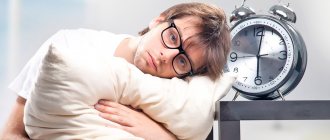Deterioration in health that develops before menstruation is a common complaint of many women. This pathological condition is manifested by a number of symptoms, one of which is sleep disturbance. Insomnia before menstruation almost always accompanies premenstrual syndrome (PMS) and develops three to five days before the onset of menstruation.
During this period, the female body is preparing for restructuring due to a failed pregnancy, as a result of which hormonal levels begin to change. Depending on the individual characteristics of the body, some women do not feel any changes in the body, and for some, pathological symptoms before menstruation are repeated regularly.
Why does this problem occur?
All the unpleasant changes that occur in the female body during PMS and during menstruation are associated, first of all, with her unstable hormonal levels and an imbalance of nutrients during this period. First of all, we are talking about reducing the amount of progesterone and testosterone, the resources of which are spent on the maturation of the egg. Their deficiency leads to an increase in the level of monoamine oxidase, a substance whose excess can cause an unstable emotional state and depression. Hence the possible sleep problems that worry women at this time. At the same time, the level of serotonin, which is primarily responsible for a person’s good mood, decreases.
Also, the causes of insomnia before menstruation lie in the deficiency of certain microelements in a woman’s blood. The main one is calcium, which is necessary for the functioning of the body as a whole and, which is especially important during premenstrual syndrome, for the stable state of the nervous system. If the level of this substance decreases, the person becomes irritable, nervous and, as a result, suffers from a lack of normal sleep. No less important in this regard is glucose, the amount of which decreases significantly before menstruation. One of its functions is to ensure the balance of estrogen and progesterone, as well as their penetration from the blood into cells. With severe glucose deficiency, disruptions in the functioning of the nervous system can occur, as a result of which a woman becomes more irritable, anxious and experiences serious difficulty falling asleep at night.
However, in addition to the completely natural physiological processes occurring in a woman’s body during PMS, the cause of insomnia during this period can also be a fairly common gynecological disease - chronic endometriosis. In this case, a constant inflammatory process can provoke a delay in menstruation, although the hormonal shift preceding menstruation occurs in a timely manner. Thus, the duration of premenstrual syndrome increases, and with it all the accompanying symptoms, including increased irritability, nervousness and lack of normal sleep, gain momentum.
The first symptoms indicating conception
The first signs of pregnancy after menstruation before the expected start of a new cycle, when a delay should occur, are weakly expressed and depend on the individual reaction of the body to the new condition. Symptoms indicating recent conception include:
- Mild pulling or tingling pain in the lower abdomen. Such sensations are normal and indicate that the uterus is preparing to bear a child.
- Enlargement and tenderness of the mammary glands. Not all women experience this symptom before the delay, but such breast changes may indicate recent conception.
- Change in the amount of vaginal discharge. Due to the rush of blood to the genitals that occurs during pregnancy, women may notice that their daily discharge has become more abundant.
- Frequent urination. The enlarging uterus begins to put pressure on the bladder, which causes frequent urge to urinate.
- Implantation bleeding. On days 6-12 after conception, light yellowish-brown discharge sometimes occurs, which women mistake for the beginning of menstruation. If they stop soon and your period never starts, it is most likely caused by the implantation of an egg into the wall of the uterus. Read more about implantation bleeding→
- A distinct manifestation of the vascular pattern on the limbs, abdomen and chest. This occurs under the influence of hormones and becomes less noticeable over time.
- Increase in basal temperature. BT is measured rectally, using a thermometer. Only those women who monitored regularly can notice the change. After conception, the so-called implantation depression occurs, when BT decreases sharply, the next day it rises above 37 ° C and remains at this level.
- Digestive disorder. Due to hormonal changes, metabolic processes in the body may be temporarily disrupted, which causes constipation or loose stools.
- Increased salivation. This symptom is associated with the onset of early toxicosis and is often accompanied by nausea or vomiting.
- Fatigue, drowsiness, fatigue. Apathy is one of the first signs of pregnancy before menstruation. This feeling can make itself felt a week after the day of expected conception. The reasons for fatigue and drowsiness are that the hormone progesterone, which begins to be produced in a pregnant woman, depresses the psyche. However, the same condition can be caused by simple fatigue or a cold.
- Feeling of heaviness in the pelvic area. The very first signs of pregnancy before the delay include a feeling of heaviness in the pelvic organs. In pregnant women, the size of the uterus increases and blood flow to the organs increases. This is why women can feel heaviness in the pelvic area even before the delay. Some women also experience a feeling of “fullness” in their organs.
- Lower back pain. Another first sign of pregnancy before your period may be lower back pain. “Shots” in the area of the sacrum give a signal to a woman that she is pregnant. It is very important to be able to distinguish them from pain that occurs due to any disease.
- Headache. Serious changes occur in a woman's body during pregnancy. They may cause headaches. They can torment a pregnant woman throughout the first trimester. The cause of their appearance can be not only pregnancy, but various diseases.
- Increased appetite. Increased appetite is one of the signs of pregnancy. In the early stages, women have a desire to enjoy something (cucumbers, ice cream, etc.), and a craving for certain foods appears. A pregnant woman, despite the increase in appetite, should eat in moderation. Overeating during pregnancy is undesirable, as is fasting. Nutrition should be complete. A pregnant woman's food should contain all the necessary nutrients in sufficient quantities.
What are the dangers of insomnia during PMS?
Regular sleep problems, characteristic of premenstrual syndrome, negatively affect both a woman’s physical health and her emotional state. This period for the female body is always associated with serious stress, associated, first of all, with the ongoing hormonal shift. At the same time, general weakness increases, which with the arrival of menstruation only intensifies due to blood loss. Accordingly, during this period, a good night's sleep and rest are especially important, which will help you quickly restore strength and return to the usual rhythm of life.
Insomnia can lead to even more irritability
In addition, due to insomnia during menstruation, irritability, anxiety, nervousness and depression, which already cause women a lot of trouble during this period, can significantly increase. But any disturbances in the functioning of the nervous system always have negative consequences, which may manifest themselves in the future during pregnancy or childbirth. That is why serious problems with sleep during PMS and during menstruation cannot be ignored, treating them as just temporary difficulties that will disappear on their own in a couple of weeks.
Causes of constant sleepiness in women
Daytime sleepiness in women is associated with fatigue, lack of energy, and loss of strength. This is caused by the following reasons:
- Oxygen starvation of the brain when being in a stuffy room. The first sign of lack of oxygen is attacks of yawning.
- Magnetic storms. Women who are weather dependent may experience ailments of varying degrees of intensity. Everyone else is drowsy.
- Vitamin deficiency.
- Irrational and unbalanced diet.
- Dehydration due to insufficient water intake during the day.
- Smoking and alcoholism.
- Hormonal imbalance.
- Heavy menstruation.
- Menopause.
- VSD diseases, blood pressure problems.
- Chronic fatigue, lack of sleep.
- Excessive physical activity.
- Development or chronic course of diseases of internal organs.
- Traumatic brain injuries.
- Nervous tension, frequent stress.
- Excessive consumption of tea or coffee.
If constant fatigue, a feeling of exhaustion and drowsiness do not allow you to live a full life, you should pay attention to your habits, your environment, listen to your body and find a solution to the problem. If you can’t do this on your own, you should consult a doctor.
How to get good sleep back
If you have difficulty falling asleep during your period, you should not immediately go to extreme measures and buy sleeping pills, because a woman can significantly improve her condition during this period and alleviate the symptoms of PMS on her own by starting to pay more attention to her health and lifestyle. To do this, first of all you need to follow a few simple recommendations:
- During your period and in the days leading up to it, avoid drinks containing caffeine or alcohol in favor of herbal teas such as chamomile or mint. In addition, a glass of warm milk with honey, linden or buckwheat, drunk at night, will help make it easier to fall asleep.
- Review your diet, replacing fatty, fried and high-calorie foods with dietary foods, primarily vegetables and fruits. The most useful during this period are celery and parsley, as well as seeds rich in vitamin E. Eliminate chocolate from the menu or at least try not to eat it before bed. Be sure to include prunes and dried apricots in your daily diet, which enrich the body with calcium and magnesium, as well as persimmon, which is rightfully considered one of the best remedies against insomnia.
- In the evenings, take walks in the fresh air or do yoga to relieve emotional stress and calm your nerves before bed. It will also be useful to take a warm bath with the addition of pine decoction.
- Use essential oils with a calming effect, primarily lavender, by dropping it on a napkin placed at the head of the bed, or by lighting an aroma lamp.
- Try to go to bed at the same time every day, without staying up late and be sure to ventilate the room.
- After consulting with your doctor in advance, introduce vitamin supplements into your diet to compensate for the deficiency of nutrients in the body during menstruation. We are talking about iron, calcium, vitamin C, as well as magnesium (at least 250 mg per day) and vitamin B6 (50-100 mg per day).
- Try to avoid stressful situations and not enter into conflicts that negatively affect the state of the nervous system.
- Lead an active lifestyle, including moderate physical activity, for example, in the form of daily morning exercises.
Daily exercise can help improve sleep
Premenstrual syndrome - signs and causes
About a week or a few days before the start of menstruation, many women notice some changes in their body, which is completely normal. Some of them experience severe weakness, drowsiness, apathy, and depressive thoughts. For others, the breasts swell and become more sensitive, swelling, dizziness, and headaches appear.
The most common reasons for the development of weakness and drowsiness are:
- A significant change in the level of female sex hormones in the blood. Progesterone and estrogen have a particular effect on well-being. They promote ovulation and egg maturation. During menstruation and immediately before its onset, progesterone levels drop sharply, which can negatively affect a woman’s well-being.
- Fatigue and lethargy during and before menstruation are explained by a lack of certain minerals in the body, such as calcium. This leads to disruption of the nervous system, convulsions, and severe psycho-emotional states .
- Decreased blood glucose levels due to hormone imbalance.
- Decreased serotonin production, which leads to poor mood and decreased performance.
- Increased concentration in the blood of aldosterone, which is produced by the adrenal glands. This causes swelling, disruption of the heart and changes in blood pressure.
Use of oral contraceptives
Want to know what to do to get your period? Start taking hormonal oral contraceptives. It is worth noting that this must be done in advance. Decide on a date that is suitable for your next bleeding. Start taking oral contraceptives a month, two or three months in advance. Approximately a couple of days before the scheduled date, stop taking the medication.
Remember that such correction must be carried out under the supervision of a doctor. Otherwise, you may end up with hormonal imbalance. The most popular drugs of this effect include “Diane”, “Logest”, “Janine” and so on.
The connection between PMS and insomnia
Very often, insomnia occurs during menstruation approximately 5-8 days in advance. This is associated with changes in hormonal levels, which affect the functioning of the entire body. This negative impact especially affects the functioning of the cardiovascular and nervous systems. Such disorders are manifested by deterioration of well-being, severe psycho-emotional state and sleep problems.
Constant lack of sleep during PMS aggravates nervousness and causes decreased performance.
Another harmful factor leading to chronic insomnia is a lack of nutrients. A woman’s body reacts especially acutely to a deficiency of serotonin, calcium, glucose, various amino acids and vitamins. This condition disrupts the normal transmission of nerve impulses to the brain, which negatively affects a person’s emotional state and disrupts his sleep.
Unfavorable factors
Nutrition. Currently, the quality of food leaves much to be desired. GMOs, dyes, flavor enhancers, flavors, and other chemical additives adversely affect the gastrointestinal tract. Before menstruation, intestinal and stomach diseases worsen. Nausea, vomiting, gas formation, diarrhea, etc. appear
In addition, ladies pay little attention to their diet. And sometimes there is simply a catastrophic lack of time for fully prepared food. Convenience foods, snacks, spicy, salty, fried foods disrupt metabolism and promote fluid retention in the body.
Before critical days, swelling, weight gain, increased sweating. Beauty requires sacrifice. Sometimes starvation diets exhaust the body so much that menstruation does not come at all or bleeding begins due to the lack of necessary components. Nutrition should be complete. At least 2 weeks before your expected period, you should follow a diet to relieve the digestive system.
Convenience foods, snacks, spicy, salty, fried foods disrupt metabolism and contribute to fluid retention in the body. Before critical days, swelling, weight gain, increased sweating. Beauty requires sacrifice. Sometimes starvation diets exhaust the body so much that menstruation does not come at all or bleeding begins due to the lack of necessary components. Nutrition should be complete. At least 2 weeks before your expected period, you should follow a diet to relieve the digestive system.
Bad habits. We can talk endlessly about the dangers of smoking and alcohol on the female body. There is no organ that is spared the negative impact.
Nervous fatigue. The influence of the nervous system on the female body is underestimated by ladies themselves. Meanwhile, severe stress, nervous tension, and an unfavorable psycho-emotional environment at home and at work aggravate the manifestations of the syndrome and significantly worsen well-being. It has been noticed that in women engaged in mental work, the manifestations of PMS are much stronger.
Lack of physical activity, sedentary lifestyle. Under such conditions, blood stagnation occurs in the pelvic organs, the ability of the uterus to quickly reject the endometrial layer decreases, pain increases, and metabolism is disrupted. Your period may come late, your discharge may be scanty or heavy.
Diseases. Of course, in the period before menstruation, all diseases worsen. The presence of hidden diseases, chronic, infectious, significantly worsens well-being.
When a woman is happy with her beloved man, satisfied with her job, children are happy, there is no shortage of money, there is time for rest, good sleep, poor health before menstruation is a fleeting phenomenon. Unfortunately, fate gives such living conditions to a few. You need to learn to cheer yourself up, be more happy, not pay attention to the small troubles of life, and value your women's health.
How to get good sleep back
Treatment for insomnia caused by PMS can occur in different ways. It all depends on the well-being and general condition of the woman, the presence of concomitant diseases.
Traditional medicine
There are many effective medications that help normalize sleep and get rid of neuroses:
- Sedatives (tincture of valerian, motherwort, Sedasen, Novopassit). They have a calming effect on the nervous system, which helps you fall asleep without problems and relieves psychological stress.
- Tranquilizers, antidepressants. These are very powerful drugs that are prescribed in extreme cases when easier drugs do not give a positive result. Such treatment can only be recommended by a doctor, since it is accompanied by significant risks due to the high likelihood of developing side effects. The duration of the course and acceptable dosages are determined only by a specialist, based on the patient’s condition .
- NPS (Ibuprofen). Prescribed to combat headaches and migraines, which often cause poor sleep.
- Diuretics. Designed to remove excess fluid from the body, which often creates problems with falling asleep.
- Hormonal therapy. If serious disturbances in the functioning of the nervous system are detected, artificial substitutes for female hormones are prescribed. Such therapy is rarely used due to the large number of side effects.
Traditional treatment
There are many effective traditional medicine recipes that have a positive effect on a woman’s well-being before the onset of menstruation and normalize sleep.
The most popular of them:
- Aromatherapy. It is recommended to place a napkin on the table near the bed, where you need to drop a little lavender oil. It calms the nervous system, which will help you fall asleep easier.
- Herbal teas. Drinks based on mint, lemon balm, and chamomile are especially useful. It is not advisable to add sugar to them. It is best to use natural honey. Disposable pharmacy filter bags are suitable for making tea.
- Milk with honey. Before going to bed, it is recommended to drink a glass of this drink .
- Herbal collection. An infusion of a mixture of components such as valerian root, mistletoe leaves, dandelion and oregano has a positive effect on a woman’s condition during the onset of PMS. They are used in a ratio of 1:3:4:5. A teaspoon of the mixture is poured with 210 ml of boiling water. After 15 minutes, drink the infusion, adding a little honey.
How to calm your nervous system
To improve the quality of sleep before menstruation and live normally, it is enough to stabilize hormonal levels and replenish the deficiency of useful components. When problematic periods are accompanied by physical weakness, pain, discomfort and insomnia, folk recipes and homeopathic medicines help.
A good way to combat insomnia before menstruation is herbal therapy. Herbs with a calming effect include chamomile, mint, wormwood, linden, St. John's wort, fireweed, lemon balm and valerian.
Additional use of vitamins C, calcium and iron has a positive effect on well-being during menstruation. Together, these beneficial substances relieve PMS symptoms, returning the woman to full and healthy sleep.
If the measures taken and remedies do not help, discuss the problem with your doctor. The causes of your insomnia may not be related to menstruation. In severe cases, when sleep disturbance before menstruation is chronic, more serious therapy is required.
With the onset of menstruation, many ladies, on the contrary, note drowsiness. You can learn more about this condition from a separate article on our website.
Prevention
To prevent the development of insomnia before the onset of menstruation, you must follow simple rules:
- Regular physical activity. Depending on your health and desire, you can sign up for a gym, swimming pool, aerobics, or just jog or walk every day. Physical activity promotes the production of endorphins, which improves mood and prevents the development of stress.
- Daily routine and enough sleep. You need to get enough sleep all month, which allows you to always feel cheerful. It is recommended to go to bed and get up at the same time. In this case, the body will develop its own biorhythms.
- Proper nutrition. To normalize the activity of the nervous system, shortly before menstruation, it is advisable to give up excessively fatty, sweet foods, alcohol, coffee and tea . It is recommended to eat often, but in small portions, and eat a lot of vegetables and fruits.
- During the period of exacerbation of all PMS symptoms, it is recommended to enrich your diet with vitamins and minerals. It is advisable to use products containing magnesium, calcium, iron, vitamins B6 and C.
Causes of insomnia before menstruation
Insomnia is considered to be a disturbance in the duration or quality of sleep. Moreover, there are no unambiguous criteria for how many hours a person should sleep, since the normal duration of rest is different for everyone.
The main signs of insomnia are as follows:
- Trouble falling asleep - a person needs a lot of time to fall asleep.
- Frequent waking up at night, after which it is difficult to fall back to sleep.
- During the day, a person is worried that he cannot sleep and rest properly.
- Efficiency and mood decrease, weakness and lethargy appear.
The danger of such manifestations of PMS
Insomnia does not bring joy to a woman's daily life. It is a consequence of even greater irritability, drowsiness, decreased performance and attention, and general nervousness. In addition, regular sleep disturbances increase the risk of the following conditions:
- Decrease in memory and even intelligence, learning ability.
- The risk of cardiovascular disease increases.
- Metabolism slows down, which can cause weight gain.
Ways to combat insomnia before menstruation
First of all, with insomnia, it is necessary to find out the cause of this condition, especially if there are any specific complaints. If sleep disturbance is just a psycho-emotional disorder, you can try to improve sleep, including changing your lifestyle, diet and using traditional medicine.
Traditional medicine for insomnia
Traditional medicine offers many different ways to combat sleep disorders. Popular and effective ones include the following:
- Honey _ It is recommended to take the beekeeping product at night. You can use kefir - two tablespoons per glass.
There is also an option with lemon juice and walnuts - mix two tablespoons of honey with the same amount of nuts, add lemon juice.
- Valerian . You need to take the root of the plant, chop it and take two tablespoons. Pour 500 ml of water at 100 degrees, let stand for about half an hour. Take a tablespoon 30 minutes before bedtime.
- Dill . You need to take 15 g of fresh plant and pour 500 ml of boiling water. Leave for at least 8 hours. Take in equal portions throughout the day.
- Soothing tea . You need to take 20 g of lemon balm leaves, 30 g of motherwort and valerian root. Pour water at 100 degrees, leave for a day and then take 40-50 ml orally.
Watch this video about traditional methods of treating insomnia:
Traditional medicine
Modern drugs that can be used to normalize sleep include drugs from different groups. Among the most effective are the following:
- Sleeping pills . They can only be purchased with a doctor's prescription. Only a specialist can select the required group of medications and establish a safe dose. Among the popular ones are Somnol and others.
- Herbal remedies . There are a large number of tinctures and herbal preparations to improve sleep. St. John's wort can be seen especially often in the composition. As a rule, they have a mild sedative effect - Deprim, Novopassit, Valocordin and others.
- Magnesium based . It is believed that magnesium relaxes the nervous system, smooth muscles of all internal organs and thereby improves sleep. The imbalance of microelements in the second phase of the cycle in women is especially relevant. Therefore, taking magnesium supplements can significantly improve sleep quality.
It is convenient that such medications are sold in pharmacies without a doctor’s prescription, for example, Magnesium B6, Magnefar, Magnelek and others. They can be in the form of tablets, capsules or powder for oral administration.
- Based on trypotophan . This substance is essential for normal sleep. Tryptophan produces melatonin (during the day) and serotonin (as darkness falls). The latter is necessary for normal sleep. Therefore, the room should be as dark as possible. Over the years, the level of melatonin synthesis decreases, and the balance is also disrupted in those who work at night. Such people can take medications based on tryptophan - Melason, Tryptophan and others.
General recommendations
You can improve your sleep quality without taking medications. The recommendations in this case are as follows:
- You should avoid foods and drinks that stimulate the nervous system - coffee, sweet, strong tea, salty foods, etc. If it is difficult to completely eliminate it from the diet, you should at least not consume it in the afternoon.
- Include more foods in your menu that are sources of magnesium and tryptophan. These are bananas, nuts, milk, buckwheat, dates, beans, apples and others.
- Make it a rule to take evening walks in the fresh air and ventilate the room before going to bed in any weather.
- Make sure that the room temperature is no higher than 22 degrees, and the humidity is at least 40-50. Otherwise, uncomfortable sleeping conditions are created.
- Choose a pillow, blanket, mattress to suit you.
- Before going to bed, you can conduct an aromatherapy session with soothing oils - lavender, mint, etc.
- It is important to follow a routine - go to bed at approximately the same time.
- Lead an active lifestyle with a high level of physical activity.
And here is more information about why you want to eat before your period.
Sleep disturbance is one of the common causes of poor health and decreased performance. They occur especially often in women in the second phase of the cycle. First of all, you need to analyze your condition and try to find out the cause of the disorder, and if necessary, consult a doctor. In most cases, insomnia can be dealt with by changing habits, lifestyle and diet, and taking simple and affordable medications.












